Impact of Social Support Systems on Chronic Illness: Research Proposal
VerifiedAdded on 2023/06/03
|19
|4854
|128
Project
AI Summary
This qualitative research proposal investigates the critical role of social support systems in managing chronic illness and depression. The study aims to understand the impact of social support on coping mechanisms, exploring the relationship between social support and depression, and assessing the effectiveness of existing strategies. The research employs a qualitative approach, drawing on the buffer theory of social support and the cognitive appraisal theory of emotions to frame its inquiry. The proposal outlines research questions, objectives, and a theoretical framework. The study seeks to identify the challenges and barriers to developing effective social support systems, and to determine the impact of awareness campaigns. The research intends to provide insights into improving healthcare and disease management by highlighting the significance of social support in enhancing patients' capacity to deal with chronic conditions and depression. The proposal emphasizes the importance of emotional, instrumental, informational, and appraisal support systems in improving patient outcomes. The research design will be based on ontology and epistemology perspectives of social support systems.
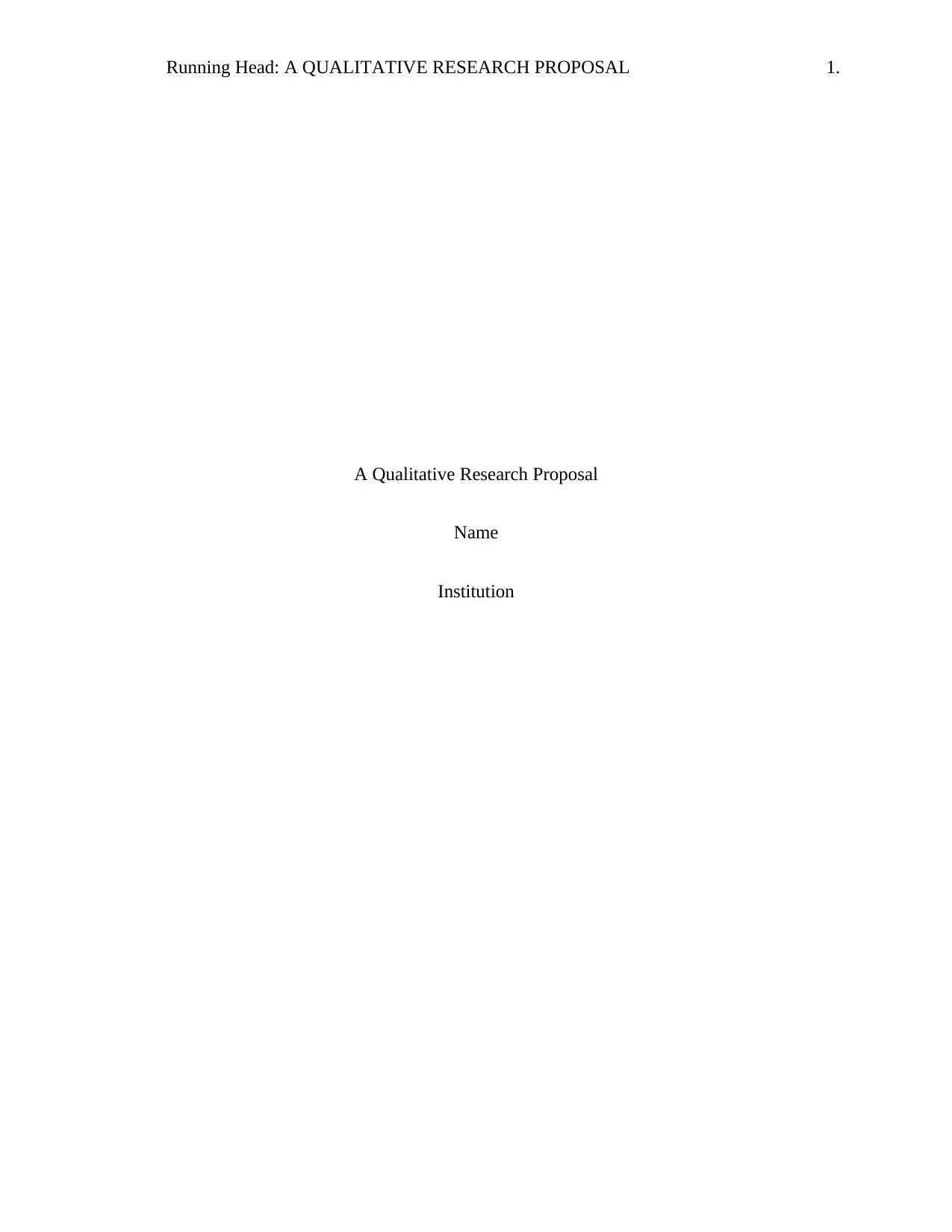
Running Head: A QUALITATIVE RESEARCH PROPOSAL 1.
A Qualitative Research Proposal
Name
Institution
A Qualitative Research Proposal
Name
Institution
Paraphrase This Document
Need a fresh take? Get an instant paraphrase of this document with our AI Paraphraser
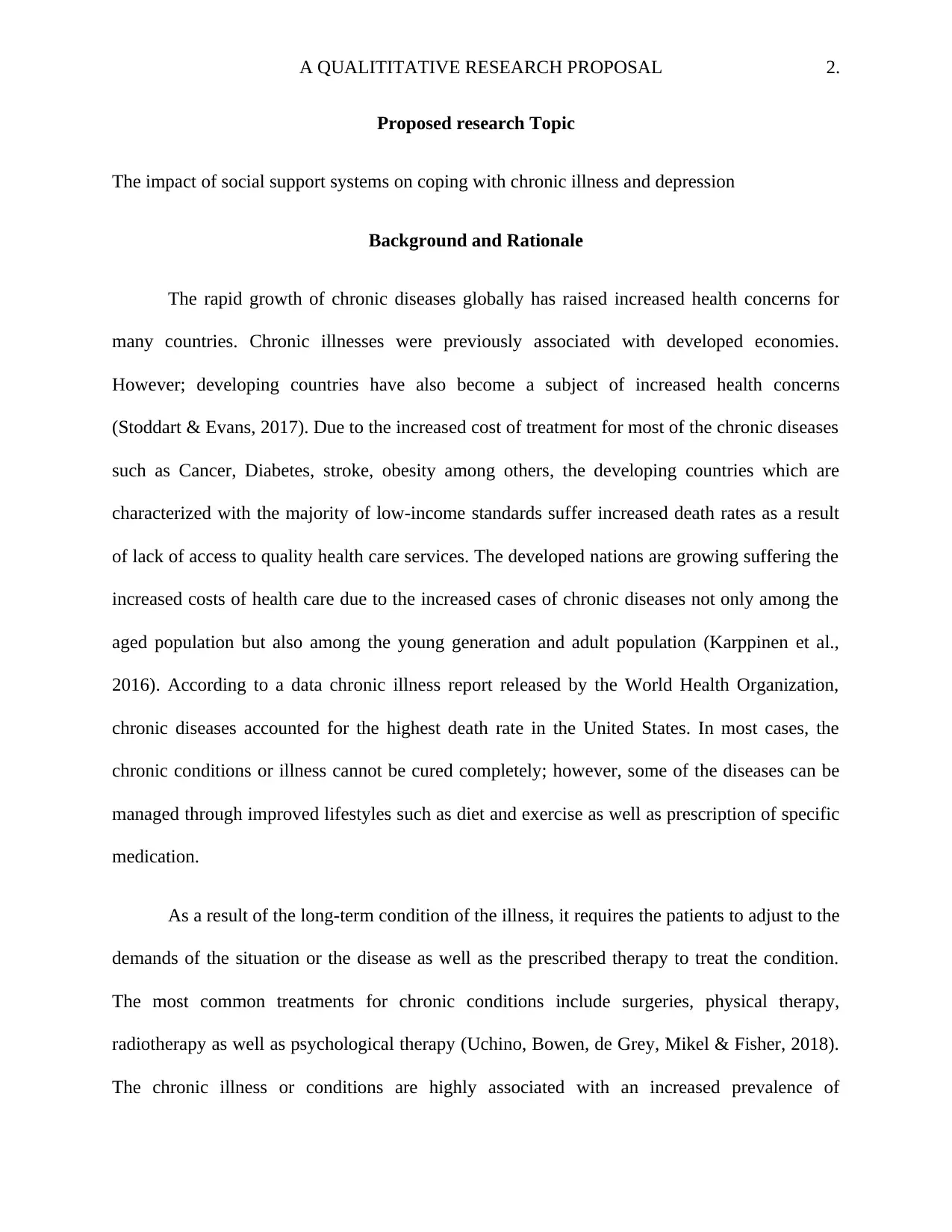
A QUALITITATIVE RESEARCH PROPOSAL 2.
Proposed research Topic
The impact of social support systems on coping with chronic illness and depression
Background and Rationale
The rapid growth of chronic diseases globally has raised increased health concerns for
many countries. Chronic illnesses were previously associated with developed economies.
However; developing countries have also become a subject of increased health concerns
(Stoddart & Evans, 2017). Due to the increased cost of treatment for most of the chronic diseases
such as Cancer, Diabetes, stroke, obesity among others, the developing countries which are
characterized with the majority of low-income standards suffer increased death rates as a result
of lack of access to quality health care services. The developed nations are growing suffering the
increased costs of health care due to the increased cases of chronic diseases not only among the
aged population but also among the young generation and adult population (Karppinen et al.,
2016). According to a data chronic illness report released by the World Health Organization,
chronic diseases accounted for the highest death rate in the United States. In most cases, the
chronic conditions or illness cannot be cured completely; however, some of the diseases can be
managed through improved lifestyles such as diet and exercise as well as prescription of specific
medication.
As a result of the long-term condition of the illness, it requires the patients to adjust to the
demands of the situation or the disease as well as the prescribed therapy to treat the condition.
The most common treatments for chronic conditions include surgeries, physical therapy,
radiotherapy as well as psychological therapy (Uchino, Bowen, de Grey, Mikel & Fisher, 2018).
The chronic illness or conditions are highly associated with an increased prevalence of
Proposed research Topic
The impact of social support systems on coping with chronic illness and depression
Background and Rationale
The rapid growth of chronic diseases globally has raised increased health concerns for
many countries. Chronic illnesses were previously associated with developed economies.
However; developing countries have also become a subject of increased health concerns
(Stoddart & Evans, 2017). Due to the increased cost of treatment for most of the chronic diseases
such as Cancer, Diabetes, stroke, obesity among others, the developing countries which are
characterized with the majority of low-income standards suffer increased death rates as a result
of lack of access to quality health care services. The developed nations are growing suffering the
increased costs of health care due to the increased cases of chronic diseases not only among the
aged population but also among the young generation and adult population (Karppinen et al.,
2016). According to a data chronic illness report released by the World Health Organization,
chronic diseases accounted for the highest death rate in the United States. In most cases, the
chronic conditions or illness cannot be cured completely; however, some of the diseases can be
managed through improved lifestyles such as diet and exercise as well as prescription of specific
medication.
As a result of the long-term condition of the illness, it requires the patients to adjust to the
demands of the situation or the disease as well as the prescribed therapy to treat the condition.
The most common treatments for chronic conditions include surgeries, physical therapy,
radiotherapy as well as psychological therapy (Uchino, Bowen, de Grey, Mikel & Fisher, 2018).
The chronic illness or conditions are highly associated with an increased prevalence of
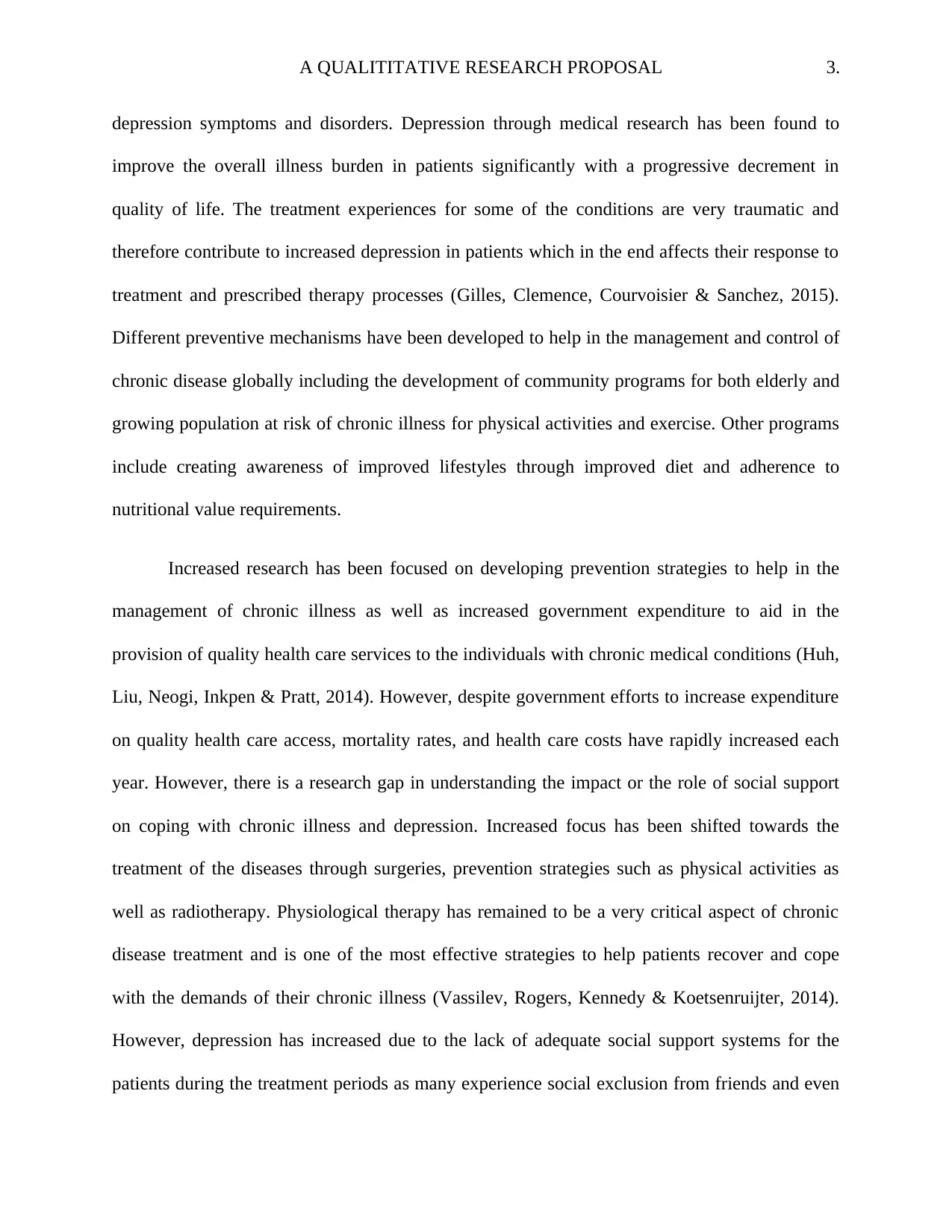
A QUALITITATIVE RESEARCH PROPOSAL 3.
depression symptoms and disorders. Depression through medical research has been found to
improve the overall illness burden in patients significantly with a progressive decrement in
quality of life. The treatment experiences for some of the conditions are very traumatic and
therefore contribute to increased depression in patients which in the end affects their response to
treatment and prescribed therapy processes (Gilles, Clemence, Courvoisier & Sanchez, 2015).
Different preventive mechanisms have been developed to help in the management and control of
chronic disease globally including the development of community programs for both elderly and
growing population at risk of chronic illness for physical activities and exercise. Other programs
include creating awareness of improved lifestyles through improved diet and adherence to
nutritional value requirements.
Increased research has been focused on developing prevention strategies to help in the
management of chronic illness as well as increased government expenditure to aid in the
provision of quality health care services to the individuals with chronic medical conditions (Huh,
Liu, Neogi, Inkpen & Pratt, 2014). However, despite government efforts to increase expenditure
on quality health care access, mortality rates, and health care costs have rapidly increased each
year. However, there is a research gap in understanding the impact or the role of social support
on coping with chronic illness and depression. Increased focus has been shifted towards the
treatment of the diseases through surgeries, prevention strategies such as physical activities as
well as radiotherapy. Physiological therapy has remained to be a very critical aspect of chronic
disease treatment and is one of the most effective strategies to help patients recover and cope
with the demands of their chronic illness (Vassilev, Rogers, Kennedy & Koetsenruijter, 2014).
However, depression has increased due to the lack of adequate social support systems for the
patients during the treatment periods as many experience social exclusion from friends and even
depression symptoms and disorders. Depression through medical research has been found to
improve the overall illness burden in patients significantly with a progressive decrement in
quality of life. The treatment experiences for some of the conditions are very traumatic and
therefore contribute to increased depression in patients which in the end affects their response to
treatment and prescribed therapy processes (Gilles, Clemence, Courvoisier & Sanchez, 2015).
Different preventive mechanisms have been developed to help in the management and control of
chronic disease globally including the development of community programs for both elderly and
growing population at risk of chronic illness for physical activities and exercise. Other programs
include creating awareness of improved lifestyles through improved diet and adherence to
nutritional value requirements.
Increased research has been focused on developing prevention strategies to help in the
management of chronic illness as well as increased government expenditure to aid in the
provision of quality health care services to the individuals with chronic medical conditions (Huh,
Liu, Neogi, Inkpen & Pratt, 2014). However, despite government efforts to increase expenditure
on quality health care access, mortality rates, and health care costs have rapidly increased each
year. However, there is a research gap in understanding the impact or the role of social support
on coping with chronic illness and depression. Increased focus has been shifted towards the
treatment of the diseases through surgeries, prevention strategies such as physical activities as
well as radiotherapy. Physiological therapy has remained to be a very critical aspect of chronic
disease treatment and is one of the most effective strategies to help patients recover and cope
with the demands of their chronic illness (Vassilev, Rogers, Kennedy & Koetsenruijter, 2014).
However, depression has increased due to the lack of adequate social support systems for the
patients during the treatment periods as many experience social exclusion from friends and even
⊘ This is a preview!⊘
Do you want full access?
Subscribe today to unlock all pages.

Trusted by 1+ million students worldwide
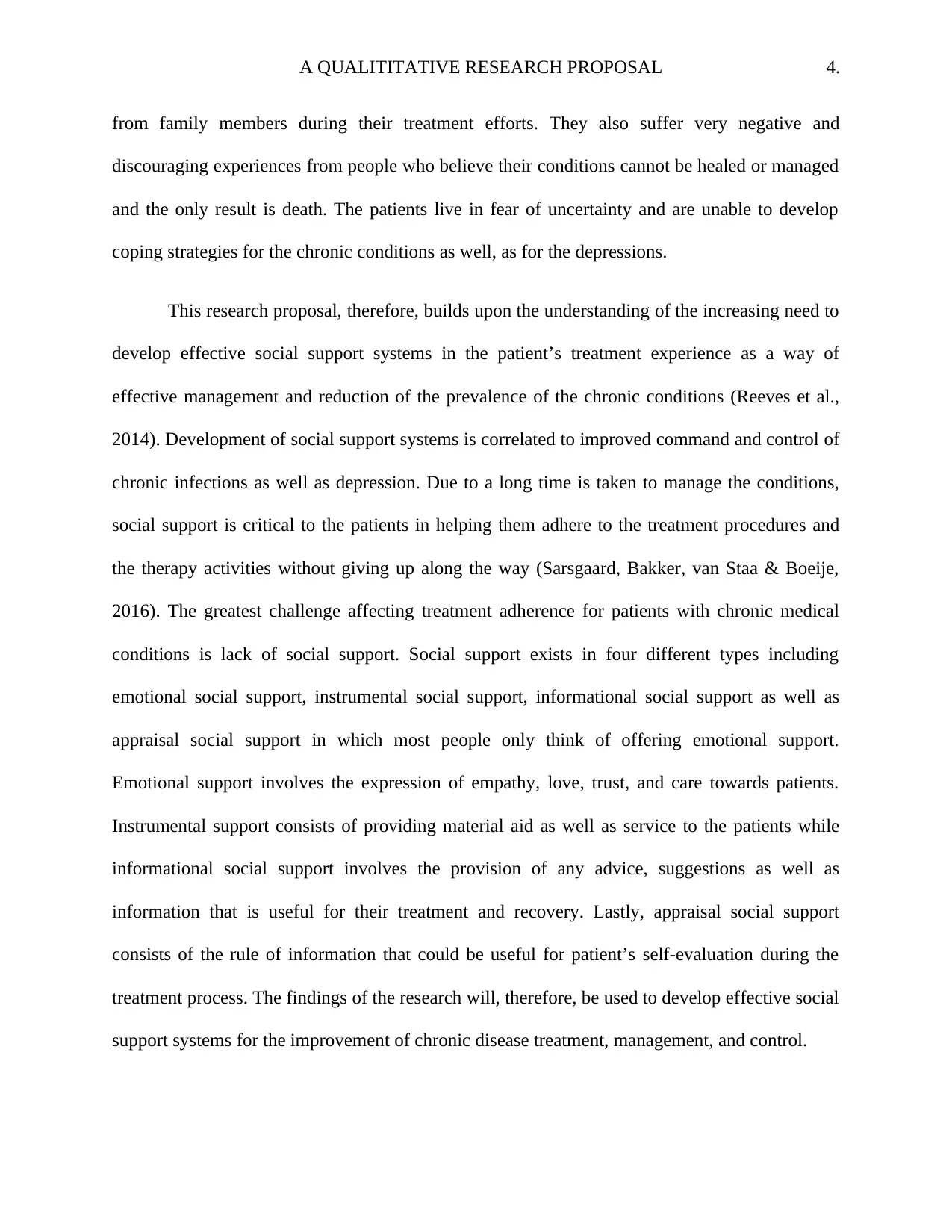
A QUALITITATIVE RESEARCH PROPOSAL 4.
from family members during their treatment efforts. They also suffer very negative and
discouraging experiences from people who believe their conditions cannot be healed or managed
and the only result is death. The patients live in fear of uncertainty and are unable to develop
coping strategies for the chronic conditions as well, as for the depressions.
This research proposal, therefore, builds upon the understanding of the increasing need to
develop effective social support systems in the patient’s treatment experience as a way of
effective management and reduction of the prevalence of the chronic conditions (Reeves et al.,
2014). Development of social support systems is correlated to improved command and control of
chronic infections as well as depression. Due to a long time is taken to manage the conditions,
social support is critical to the patients in helping them adhere to the treatment procedures and
the therapy activities without giving up along the way (Sarsgaard, Bakker, van Staa & Boeije,
2016). The greatest challenge affecting treatment adherence for patients with chronic medical
conditions is lack of social support. Social support exists in four different types including
emotional social support, instrumental social support, informational social support as well as
appraisal social support in which most people only think of offering emotional support.
Emotional support involves the expression of empathy, love, trust, and care towards patients.
Instrumental support consists of providing material aid as well as service to the patients while
informational social support involves the provision of any advice, suggestions as well as
information that is useful for their treatment and recovery. Lastly, appraisal social support
consists of the rule of information that could be useful for patient’s self-evaluation during the
treatment process. The findings of the research will, therefore, be used to develop effective social
support systems for the improvement of chronic disease treatment, management, and control.
from family members during their treatment efforts. They also suffer very negative and
discouraging experiences from people who believe their conditions cannot be healed or managed
and the only result is death. The patients live in fear of uncertainty and are unable to develop
coping strategies for the chronic conditions as well, as for the depressions.
This research proposal, therefore, builds upon the understanding of the increasing need to
develop effective social support systems in the patient’s treatment experience as a way of
effective management and reduction of the prevalence of the chronic conditions (Reeves et al.,
2014). Development of social support systems is correlated to improved command and control of
chronic infections as well as depression. Due to a long time is taken to manage the conditions,
social support is critical to the patients in helping them adhere to the treatment procedures and
the therapy activities without giving up along the way (Sarsgaard, Bakker, van Staa & Boeije,
2016). The greatest challenge affecting treatment adherence for patients with chronic medical
conditions is lack of social support. Social support exists in four different types including
emotional social support, instrumental social support, informational social support as well as
appraisal social support in which most people only think of offering emotional support.
Emotional support involves the expression of empathy, love, trust, and care towards patients.
Instrumental support consists of providing material aid as well as service to the patients while
informational social support involves the provision of any advice, suggestions as well as
information that is useful for their treatment and recovery. Lastly, appraisal social support
consists of the rule of information that could be useful for patient’s self-evaluation during the
treatment process. The findings of the research will, therefore, be used to develop effective social
support systems for the improvement of chronic disease treatment, management, and control.
Paraphrase This Document
Need a fresh take? Get an instant paraphrase of this document with our AI Paraphraser
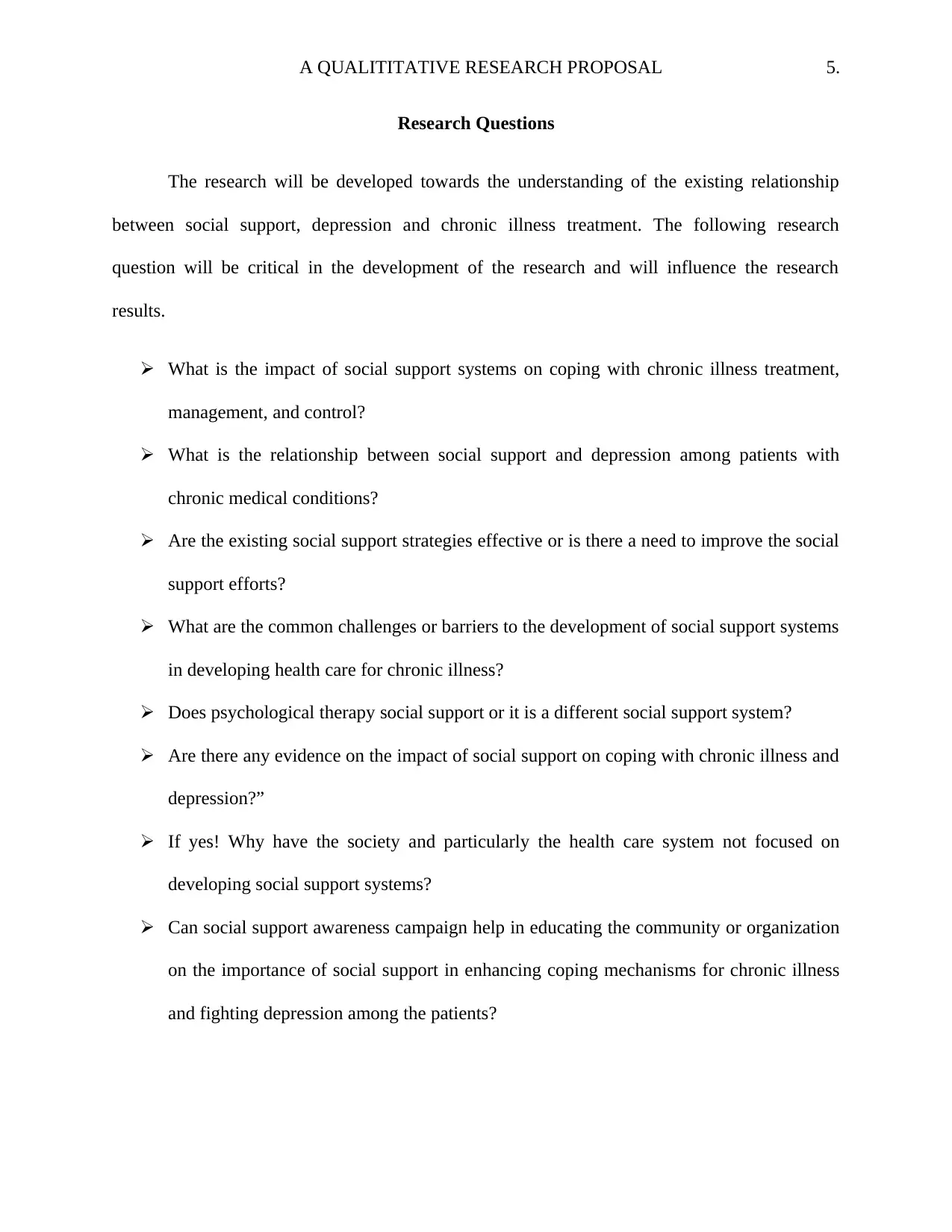
A QUALITITATIVE RESEARCH PROPOSAL 5.
Research Questions
The research will be developed towards the understanding of the existing relationship
between social support, depression and chronic illness treatment. The following research
question will be critical in the development of the research and will influence the research
results.
What is the impact of social support systems on coping with chronic illness treatment,
management, and control?
What is the relationship between social support and depression among patients with
chronic medical conditions?
Are the existing social support strategies effective or is there a need to improve the social
support efforts?
What are the common challenges or barriers to the development of social support systems
in developing health care for chronic illness?
Does psychological therapy social support or it is a different social support system?
Are there any evidence on the impact of social support on coping with chronic illness and
depression?”
If yes! Why have the society and particularly the health care system not focused on
developing social support systems?
Can social support awareness campaign help in educating the community or organization
on the importance of social support in enhancing coping mechanisms for chronic illness
and fighting depression among the patients?
Research Questions
The research will be developed towards the understanding of the existing relationship
between social support, depression and chronic illness treatment. The following research
question will be critical in the development of the research and will influence the research
results.
What is the impact of social support systems on coping with chronic illness treatment,
management, and control?
What is the relationship between social support and depression among patients with
chronic medical conditions?
Are the existing social support strategies effective or is there a need to improve the social
support efforts?
What are the common challenges or barriers to the development of social support systems
in developing health care for chronic illness?
Does psychological therapy social support or it is a different social support system?
Are there any evidence on the impact of social support on coping with chronic illness and
depression?”
If yes! Why have the society and particularly the health care system not focused on
developing social support systems?
Can social support awareness campaign help in educating the community or organization
on the importance of social support in enhancing coping mechanisms for chronic illness
and fighting depression among the patients?
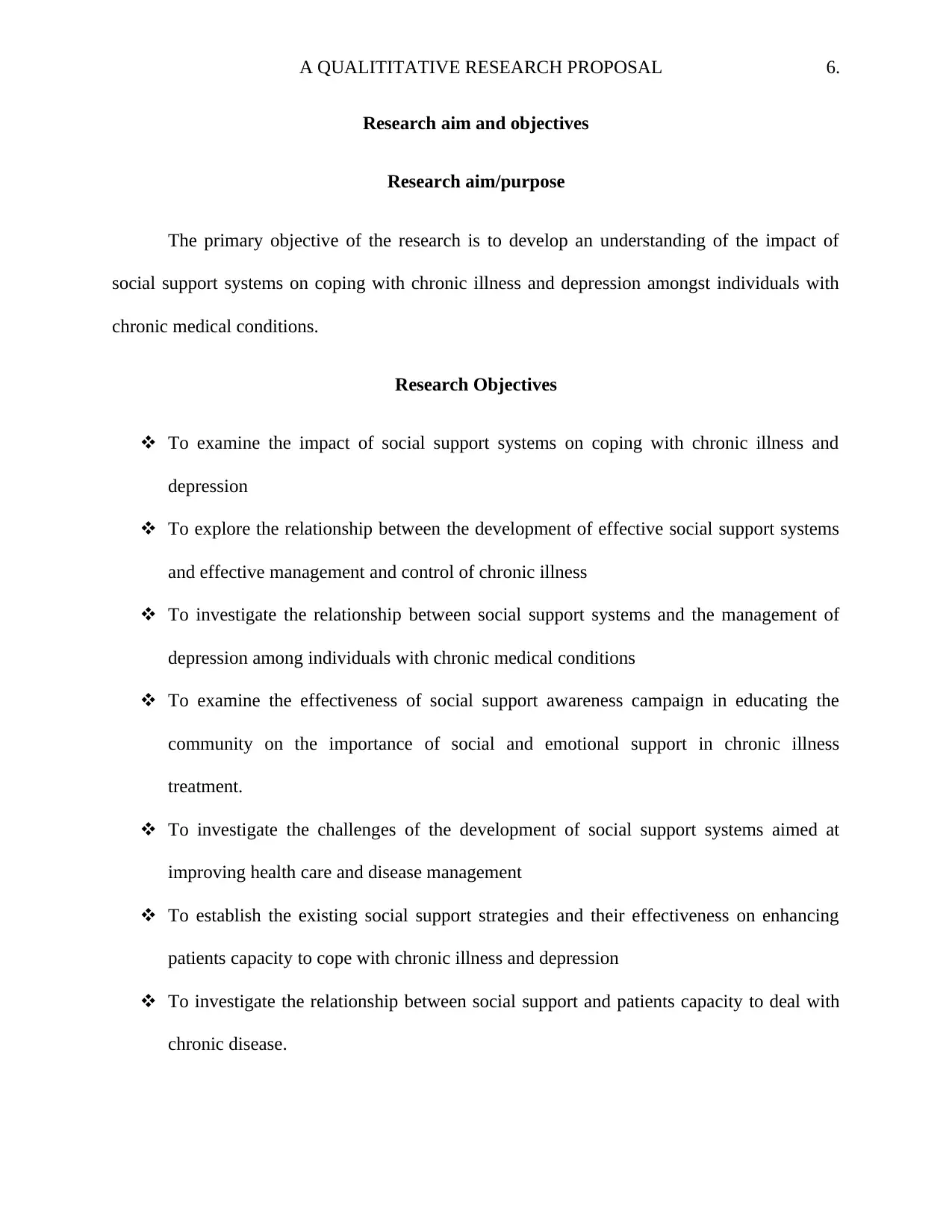
A QUALITITATIVE RESEARCH PROPOSAL 6.
Research aim and objectives
Research aim/purpose
The primary objective of the research is to develop an understanding of the impact of
social support systems on coping with chronic illness and depression amongst individuals with
chronic medical conditions.
Research Objectives
To examine the impact of social support systems on coping with chronic illness and
depression
To explore the relationship between the development of effective social support systems
and effective management and control of chronic illness
To investigate the relationship between social support systems and the management of
depression among individuals with chronic medical conditions
To examine the effectiveness of social support awareness campaign in educating the
community on the importance of social and emotional support in chronic illness
treatment.
To investigate the challenges of the development of social support systems aimed at
improving health care and disease management
To establish the existing social support strategies and their effectiveness on enhancing
patients capacity to cope with chronic illness and depression
To investigate the relationship between social support and patients capacity to deal with
chronic disease.
Research aim and objectives
Research aim/purpose
The primary objective of the research is to develop an understanding of the impact of
social support systems on coping with chronic illness and depression amongst individuals with
chronic medical conditions.
Research Objectives
To examine the impact of social support systems on coping with chronic illness and
depression
To explore the relationship between the development of effective social support systems
and effective management and control of chronic illness
To investigate the relationship between social support systems and the management of
depression among individuals with chronic medical conditions
To examine the effectiveness of social support awareness campaign in educating the
community on the importance of social and emotional support in chronic illness
treatment.
To investigate the challenges of the development of social support systems aimed at
improving health care and disease management
To establish the existing social support strategies and their effectiveness on enhancing
patients capacity to cope with chronic illness and depression
To investigate the relationship between social support and patients capacity to deal with
chronic disease.
⊘ This is a preview!⊘
Do you want full access?
Subscribe today to unlock all pages.

Trusted by 1+ million students worldwide
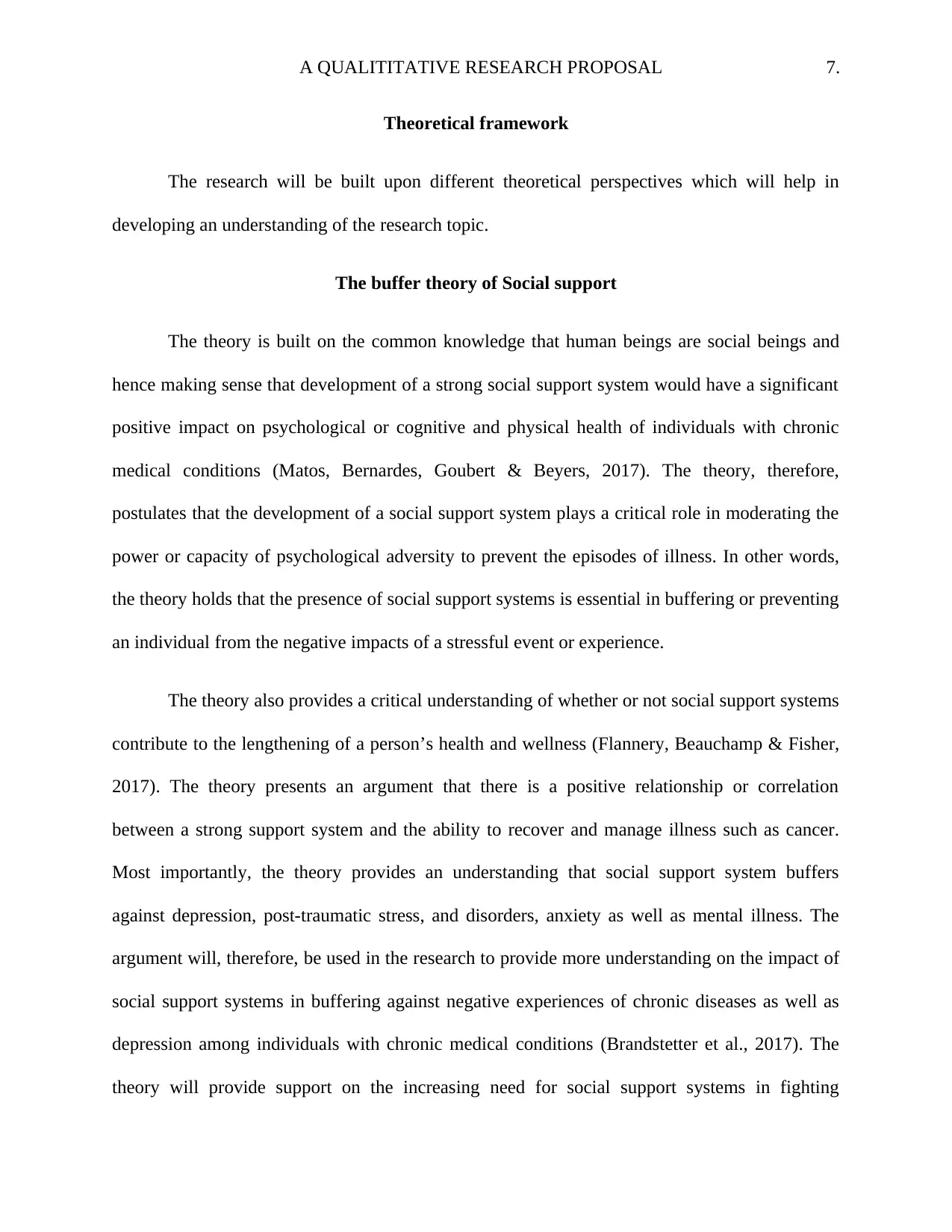
A QUALITITATIVE RESEARCH PROPOSAL 7.
Theoretical framework
The research will be built upon different theoretical perspectives which will help in
developing an understanding of the research topic.
The buffer theory of Social support
The theory is built on the common knowledge that human beings are social beings and
hence making sense that development of a strong social support system would have a significant
positive impact on psychological or cognitive and physical health of individuals with chronic
medical conditions (Matos, Bernardes, Goubert & Beyers, 2017). The theory, therefore,
postulates that the development of a social support system plays a critical role in moderating the
power or capacity of psychological adversity to prevent the episodes of illness. In other words,
the theory holds that the presence of social support systems is essential in buffering or preventing
an individual from the negative impacts of a stressful event or experience.
The theory also provides a critical understanding of whether or not social support systems
contribute to the lengthening of a person’s health and wellness (Flannery, Beauchamp & Fisher,
2017). The theory presents an argument that there is a positive relationship or correlation
between a strong support system and the ability to recover and manage illness such as cancer.
Most importantly, the theory provides an understanding that social support system buffers
against depression, post-traumatic stress, and disorders, anxiety as well as mental illness. The
argument will, therefore, be used in the research to provide more understanding on the impact of
social support systems in buffering against negative experiences of chronic diseases as well as
depression among individuals with chronic medical conditions (Brandstetter et al., 2017). The
theory will provide support on the increasing need for social support systems in fighting
Theoretical framework
The research will be built upon different theoretical perspectives which will help in
developing an understanding of the research topic.
The buffer theory of Social support
The theory is built on the common knowledge that human beings are social beings and
hence making sense that development of a strong social support system would have a significant
positive impact on psychological or cognitive and physical health of individuals with chronic
medical conditions (Matos, Bernardes, Goubert & Beyers, 2017). The theory, therefore,
postulates that the development of a social support system plays a critical role in moderating the
power or capacity of psychological adversity to prevent the episodes of illness. In other words,
the theory holds that the presence of social support systems is essential in buffering or preventing
an individual from the negative impacts of a stressful event or experience.
The theory also provides a critical understanding of whether or not social support systems
contribute to the lengthening of a person’s health and wellness (Flannery, Beauchamp & Fisher,
2017). The theory presents an argument that there is a positive relationship or correlation
between a strong support system and the ability to recover and manage illness such as cancer.
Most importantly, the theory provides an understanding that social support system buffers
against depression, post-traumatic stress, and disorders, anxiety as well as mental illness. The
argument will, therefore, be used in the research to provide more understanding on the impact of
social support systems in buffering against negative experiences of chronic diseases as well as
depression among individuals with chronic medical conditions (Brandstetter et al., 2017). The
theory will provide support on the increasing need for social support systems in fighting
Paraphrase This Document
Need a fresh take? Get an instant paraphrase of this document with our AI Paraphraser
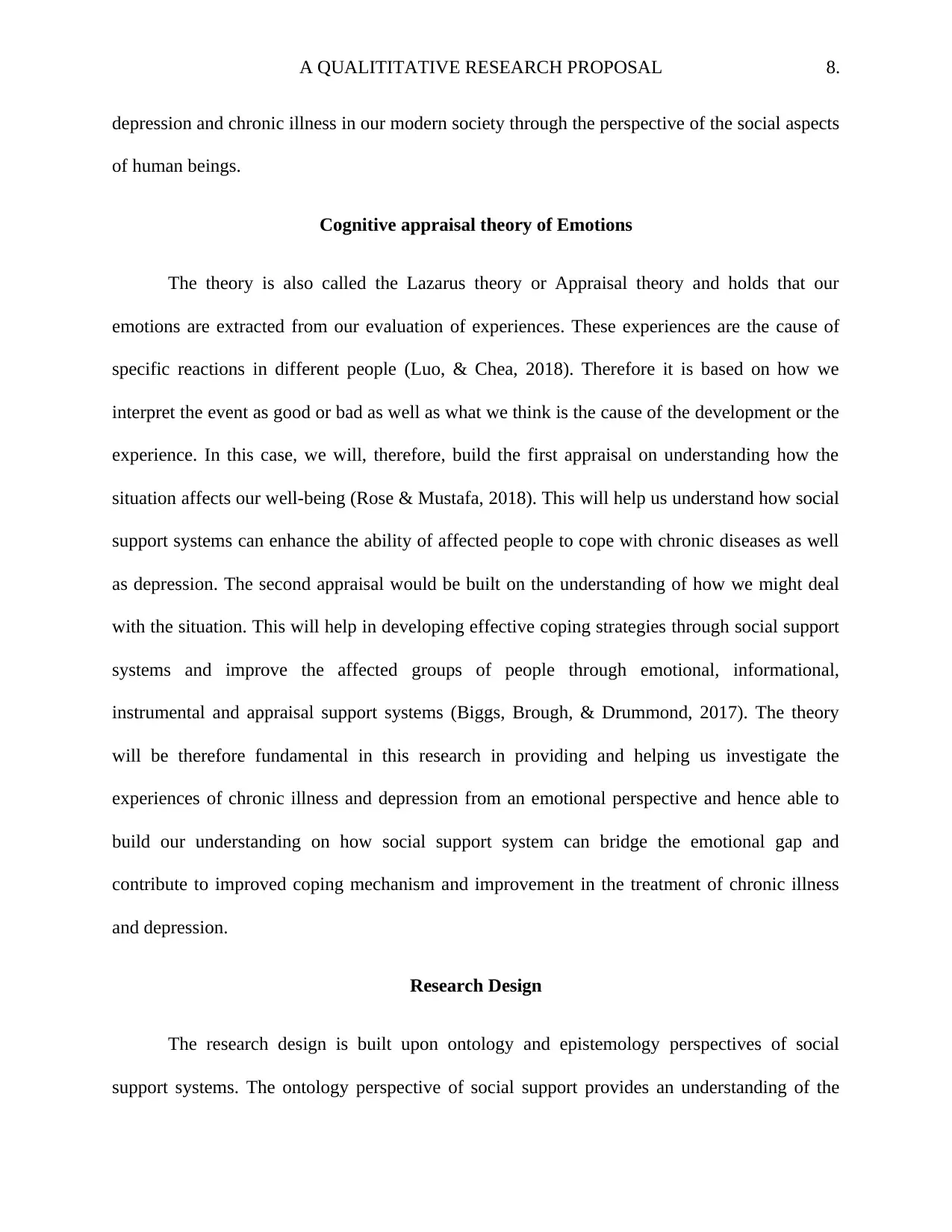
A QUALITITATIVE RESEARCH PROPOSAL 8.
depression and chronic illness in our modern society through the perspective of the social aspects
of human beings.
Cognitive appraisal theory of Emotions
The theory is also called the Lazarus theory or Appraisal theory and holds that our
emotions are extracted from our evaluation of experiences. These experiences are the cause of
specific reactions in different people (Luo, & Chea, 2018). Therefore it is based on how we
interpret the event as good or bad as well as what we think is the cause of the development or the
experience. In this case, we will, therefore, build the first appraisal on understanding how the
situation affects our well-being (Rose & Mustafa, 2018). This will help us understand how social
support systems can enhance the ability of affected people to cope with chronic diseases as well
as depression. The second appraisal would be built on the understanding of how we might deal
with the situation. This will help in developing effective coping strategies through social support
systems and improve the affected groups of people through emotional, informational,
instrumental and appraisal support systems (Biggs, Brough, & Drummond, 2017). The theory
will be therefore fundamental in this research in providing and helping us investigate the
experiences of chronic illness and depression from an emotional perspective and hence able to
build our understanding on how social support system can bridge the emotional gap and
contribute to improved coping mechanism and improvement in the treatment of chronic illness
and depression.
Research Design
The research design is built upon ontology and epistemology perspectives of social
support systems. The ontology perspective of social support provides an understanding of the
depression and chronic illness in our modern society through the perspective of the social aspects
of human beings.
Cognitive appraisal theory of Emotions
The theory is also called the Lazarus theory or Appraisal theory and holds that our
emotions are extracted from our evaluation of experiences. These experiences are the cause of
specific reactions in different people (Luo, & Chea, 2018). Therefore it is based on how we
interpret the event as good or bad as well as what we think is the cause of the development or the
experience. In this case, we will, therefore, build the first appraisal on understanding how the
situation affects our well-being (Rose & Mustafa, 2018). This will help us understand how social
support systems can enhance the ability of affected people to cope with chronic diseases as well
as depression. The second appraisal would be built on the understanding of how we might deal
with the situation. This will help in developing effective coping strategies through social support
systems and improve the affected groups of people through emotional, informational,
instrumental and appraisal support systems (Biggs, Brough, & Drummond, 2017). The theory
will be therefore fundamental in this research in providing and helping us investigate the
experiences of chronic illness and depression from an emotional perspective and hence able to
build our understanding on how social support system can bridge the emotional gap and
contribute to improved coping mechanism and improvement in the treatment of chronic illness
and depression.
Research Design
The research design is built upon ontology and epistemology perspectives of social
support systems. The ontology perspective of social support provides an understanding of the
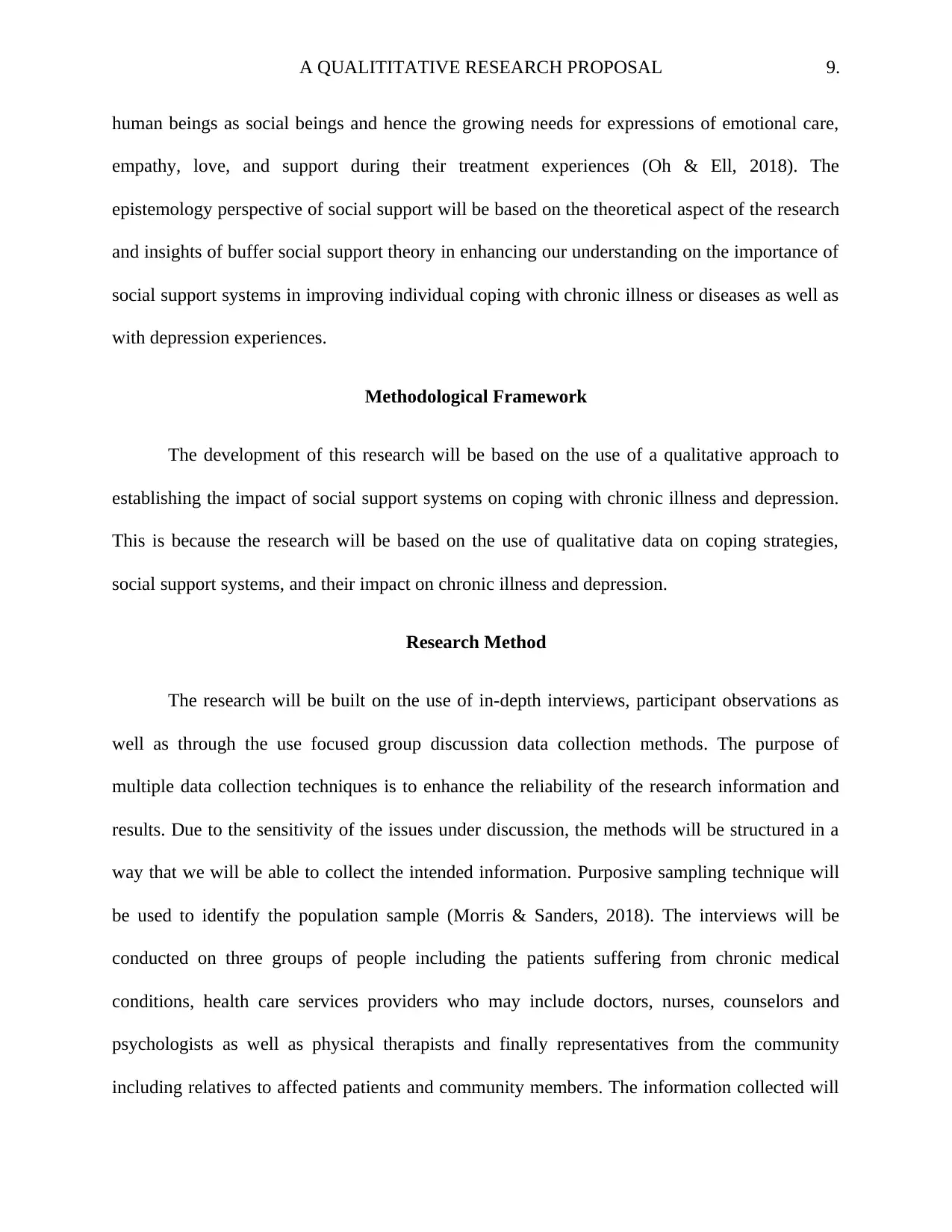
A QUALITITATIVE RESEARCH PROPOSAL 9.
human beings as social beings and hence the growing needs for expressions of emotional care,
empathy, love, and support during their treatment experiences (Oh & Ell, 2018). The
epistemology perspective of social support will be based on the theoretical aspect of the research
and insights of buffer social support theory in enhancing our understanding on the importance of
social support systems in improving individual coping with chronic illness or diseases as well as
with depression experiences.
Methodological Framework
The development of this research will be based on the use of a qualitative approach to
establishing the impact of social support systems on coping with chronic illness and depression.
This is because the research will be based on the use of qualitative data on coping strategies,
social support systems, and their impact on chronic illness and depression.
Research Method
The research will be built on the use of in-depth interviews, participant observations as
well as through the use focused group discussion data collection methods. The purpose of
multiple data collection techniques is to enhance the reliability of the research information and
results. Due to the sensitivity of the issues under discussion, the methods will be structured in a
way that we will be able to collect the intended information. Purposive sampling technique will
be used to identify the population sample (Morris & Sanders, 2018). The interviews will be
conducted on three groups of people including the patients suffering from chronic medical
conditions, health care services providers who may include doctors, nurses, counselors and
psychologists as well as physical therapists and finally representatives from the community
including relatives to affected patients and community members. The information collected will
human beings as social beings and hence the growing needs for expressions of emotional care,
empathy, love, and support during their treatment experiences (Oh & Ell, 2018). The
epistemology perspective of social support will be based on the theoretical aspect of the research
and insights of buffer social support theory in enhancing our understanding on the importance of
social support systems in improving individual coping with chronic illness or diseases as well as
with depression experiences.
Methodological Framework
The development of this research will be based on the use of a qualitative approach to
establishing the impact of social support systems on coping with chronic illness and depression.
This is because the research will be based on the use of qualitative data on coping strategies,
social support systems, and their impact on chronic illness and depression.
Research Method
The research will be built on the use of in-depth interviews, participant observations as
well as through the use focused group discussion data collection methods. The purpose of
multiple data collection techniques is to enhance the reliability of the research information and
results. Due to the sensitivity of the issues under discussion, the methods will be structured in a
way that we will be able to collect the intended information. Purposive sampling technique will
be used to identify the population sample (Morris & Sanders, 2018). The interviews will be
conducted on three groups of people including the patients suffering from chronic medical
conditions, health care services providers who may include doctors, nurses, counselors and
psychologists as well as physical therapists and finally representatives from the community
including relatives to affected patients and community members. The information collected will
⊘ This is a preview!⊘
Do you want full access?
Subscribe today to unlock all pages.

Trusted by 1+ million students worldwide
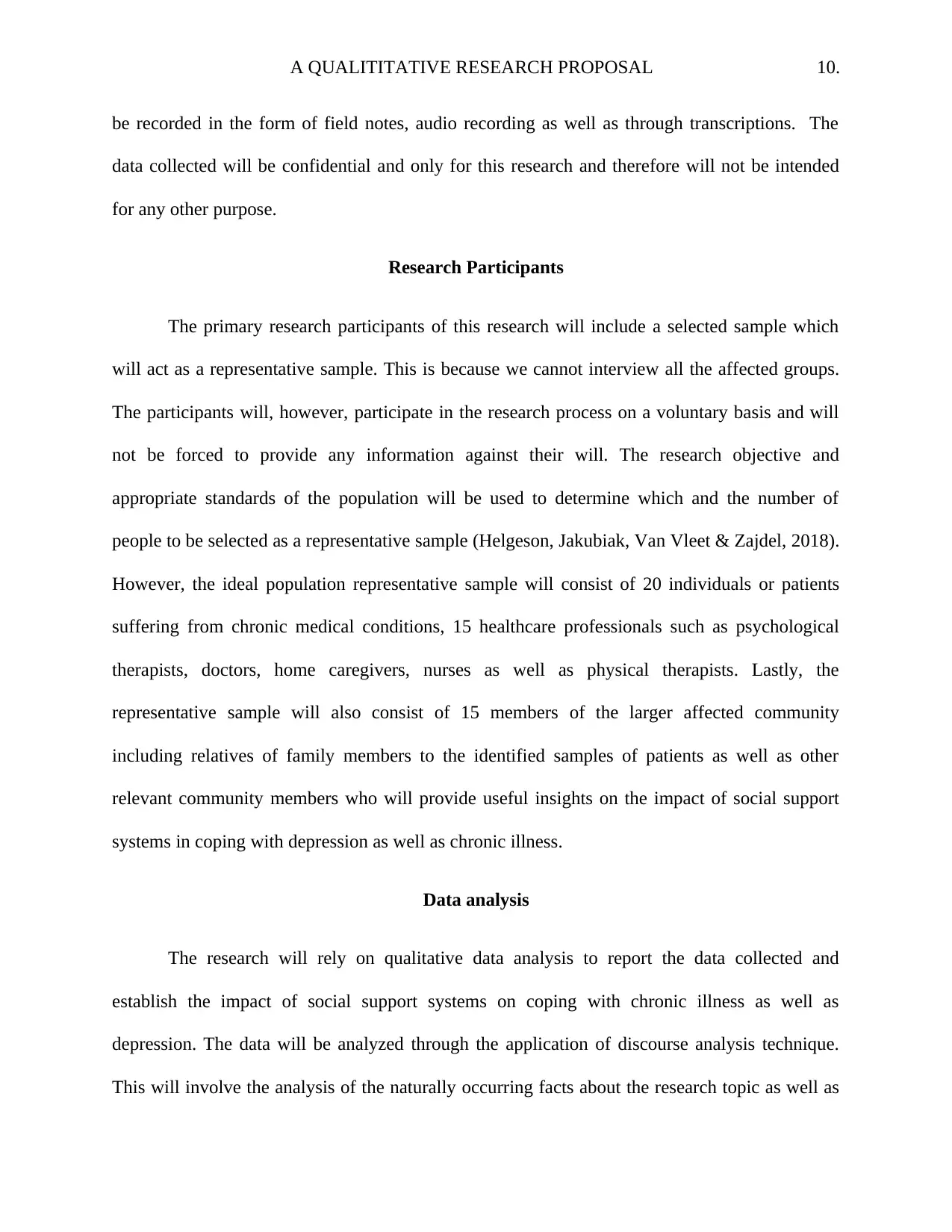
A QUALITITATIVE RESEARCH PROPOSAL 10.
be recorded in the form of field notes, audio recording as well as through transcriptions. The
data collected will be confidential and only for this research and therefore will not be intended
for any other purpose.
Research Participants
The primary research participants of this research will include a selected sample which
will act as a representative sample. This is because we cannot interview all the affected groups.
The participants will, however, participate in the research process on a voluntary basis and will
not be forced to provide any information against their will. The research objective and
appropriate standards of the population will be used to determine which and the number of
people to be selected as a representative sample (Helgeson, Jakubiak, Van Vleet & Zajdel, 2018).
However, the ideal population representative sample will consist of 20 individuals or patients
suffering from chronic medical conditions, 15 healthcare professionals such as psychological
therapists, doctors, home caregivers, nurses as well as physical therapists. Lastly, the
representative sample will also consist of 15 members of the larger affected community
including relatives of family members to the identified samples of patients as well as other
relevant community members who will provide useful insights on the impact of social support
systems in coping with depression as well as chronic illness.
Data analysis
The research will rely on qualitative data analysis to report the data collected and
establish the impact of social support systems on coping with chronic illness as well as
depression. The data will be analyzed through the application of discourse analysis technique.
This will involve the analysis of the naturally occurring facts about the research topic as well as
be recorded in the form of field notes, audio recording as well as through transcriptions. The
data collected will be confidential and only for this research and therefore will not be intended
for any other purpose.
Research Participants
The primary research participants of this research will include a selected sample which
will act as a representative sample. This is because we cannot interview all the affected groups.
The participants will, however, participate in the research process on a voluntary basis and will
not be forced to provide any information against their will. The research objective and
appropriate standards of the population will be used to determine which and the number of
people to be selected as a representative sample (Helgeson, Jakubiak, Van Vleet & Zajdel, 2018).
However, the ideal population representative sample will consist of 20 individuals or patients
suffering from chronic medical conditions, 15 healthcare professionals such as psychological
therapists, doctors, home caregivers, nurses as well as physical therapists. Lastly, the
representative sample will also consist of 15 members of the larger affected community
including relatives of family members to the identified samples of patients as well as other
relevant community members who will provide useful insights on the impact of social support
systems in coping with depression as well as chronic illness.
Data analysis
The research will rely on qualitative data analysis to report the data collected and
establish the impact of social support systems on coping with chronic illness as well as
depression. The data will be analyzed through the application of discourse analysis technique.
This will involve the analysis of the naturally occurring facts about the research topic as well as
Paraphrase This Document
Need a fresh take? Get an instant paraphrase of this document with our AI Paraphraser
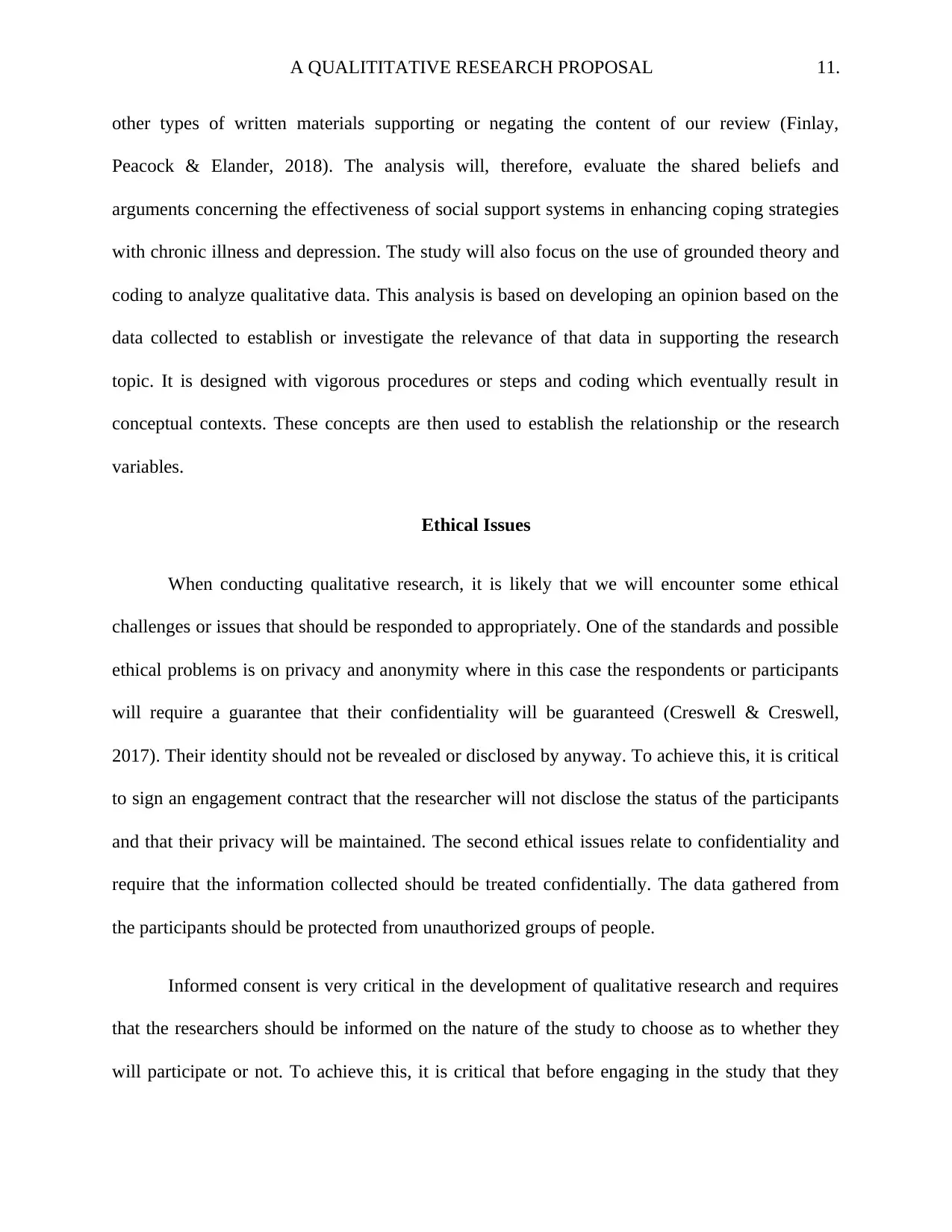
A QUALITITATIVE RESEARCH PROPOSAL 11.
other types of written materials supporting or negating the content of our review (Finlay,
Peacock & Elander, 2018). The analysis will, therefore, evaluate the shared beliefs and
arguments concerning the effectiveness of social support systems in enhancing coping strategies
with chronic illness and depression. The study will also focus on the use of grounded theory and
coding to analyze qualitative data. This analysis is based on developing an opinion based on the
data collected to establish or investigate the relevance of that data in supporting the research
topic. It is designed with vigorous procedures or steps and coding which eventually result in
conceptual contexts. These concepts are then used to establish the relationship or the research
variables.
Ethical Issues
When conducting qualitative research, it is likely that we will encounter some ethical
challenges or issues that should be responded to appropriately. One of the standards and possible
ethical problems is on privacy and anonymity where in this case the respondents or participants
will require a guarantee that their confidentiality will be guaranteed (Creswell & Creswell,
2017). Their identity should not be revealed or disclosed by anyway. To achieve this, it is critical
to sign an engagement contract that the researcher will not disclose the status of the participants
and that their privacy will be maintained. The second ethical issues relate to confidentiality and
require that the information collected should be treated confidentially. The data gathered from
the participants should be protected from unauthorized groups of people.
Informed consent is very critical in the development of qualitative research and requires
that the researchers should be informed on the nature of the study to choose as to whether they
will participate or not. To achieve this, it is critical that before engaging in the study that they
other types of written materials supporting or negating the content of our review (Finlay,
Peacock & Elander, 2018). The analysis will, therefore, evaluate the shared beliefs and
arguments concerning the effectiveness of social support systems in enhancing coping strategies
with chronic illness and depression. The study will also focus on the use of grounded theory and
coding to analyze qualitative data. This analysis is based on developing an opinion based on the
data collected to establish or investigate the relevance of that data in supporting the research
topic. It is designed with vigorous procedures or steps and coding which eventually result in
conceptual contexts. These concepts are then used to establish the relationship or the research
variables.
Ethical Issues
When conducting qualitative research, it is likely that we will encounter some ethical
challenges or issues that should be responded to appropriately. One of the standards and possible
ethical problems is on privacy and anonymity where in this case the respondents or participants
will require a guarantee that their confidentiality will be guaranteed (Creswell & Creswell,
2017). Their identity should not be revealed or disclosed by anyway. To achieve this, it is critical
to sign an engagement contract that the researcher will not disclose the status of the participants
and that their privacy will be maintained. The second ethical issues relate to confidentiality and
require that the information collected should be treated confidentially. The data gathered from
the participants should be protected from unauthorized groups of people.
Informed consent is very critical in the development of qualitative research and requires
that the researchers should be informed on the nature of the study to choose as to whether they
will participate or not. To achieve this, it is critical that before engaging in the study that they
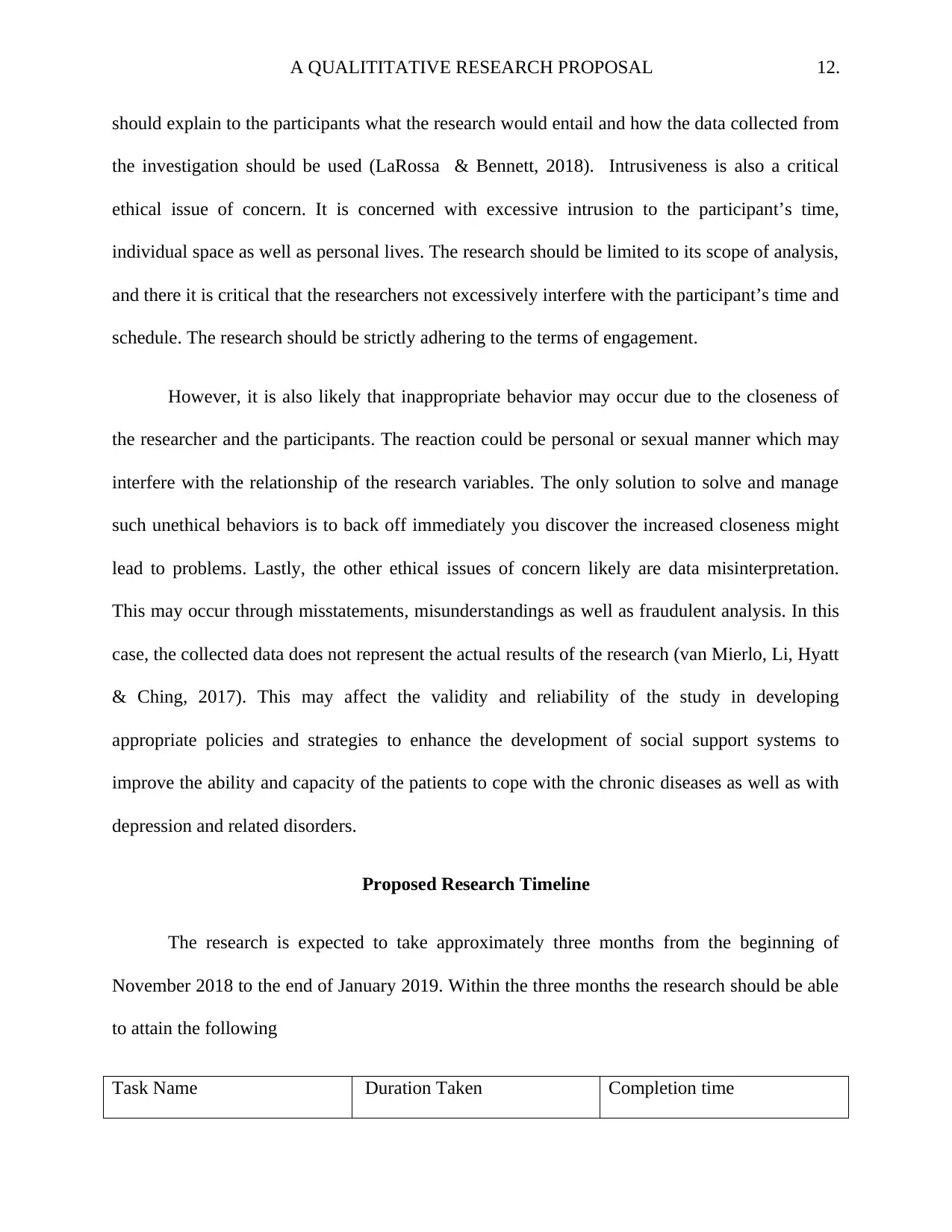
A QUALITITATIVE RESEARCH PROPOSAL 12.
should explain to the participants what the research would entail and how the data collected from
the investigation should be used (LaRossa & Bennett, 2018). Intrusiveness is also a critical
ethical issue of concern. It is concerned with excessive intrusion to the participant’s time,
individual space as well as personal lives. The research should be limited to its scope of analysis,
and there it is critical that the researchers not excessively interfere with the participant’s time and
schedule. The research should be strictly adhering to the terms of engagement.
However, it is also likely that inappropriate behavior may occur due to the closeness of
the researcher and the participants. The reaction could be personal or sexual manner which may
interfere with the relationship of the research variables. The only solution to solve and manage
such unethical behaviors is to back off immediately you discover the increased closeness might
lead to problems. Lastly, the other ethical issues of concern likely are data misinterpretation.
This may occur through misstatements, misunderstandings as well as fraudulent analysis. In this
case, the collected data does not represent the actual results of the research (van Mierlo, Li, Hyatt
& Ching, 2017). This may affect the validity and reliability of the study in developing
appropriate policies and strategies to enhance the development of social support systems to
improve the ability and capacity of the patients to cope with the chronic diseases as well as with
depression and related disorders.
Proposed Research Timeline
The research is expected to take approximately three months from the beginning of
November 2018 to the end of January 2019. Within the three months the research should be able
to attain the following
Task Name Duration Taken Completion time
should explain to the participants what the research would entail and how the data collected from
the investigation should be used (LaRossa & Bennett, 2018). Intrusiveness is also a critical
ethical issue of concern. It is concerned with excessive intrusion to the participant’s time,
individual space as well as personal lives. The research should be limited to its scope of analysis,
and there it is critical that the researchers not excessively interfere with the participant’s time and
schedule. The research should be strictly adhering to the terms of engagement.
However, it is also likely that inappropriate behavior may occur due to the closeness of
the researcher and the participants. The reaction could be personal or sexual manner which may
interfere with the relationship of the research variables. The only solution to solve and manage
such unethical behaviors is to back off immediately you discover the increased closeness might
lead to problems. Lastly, the other ethical issues of concern likely are data misinterpretation.
This may occur through misstatements, misunderstandings as well as fraudulent analysis. In this
case, the collected data does not represent the actual results of the research (van Mierlo, Li, Hyatt
& Ching, 2017). This may affect the validity and reliability of the study in developing
appropriate policies and strategies to enhance the development of social support systems to
improve the ability and capacity of the patients to cope with the chronic diseases as well as with
depression and related disorders.
Proposed Research Timeline
The research is expected to take approximately three months from the beginning of
November 2018 to the end of January 2019. Within the three months the research should be able
to attain the following
Task Name Duration Taken Completion time
⊘ This is a preview!⊘
Do you want full access?
Subscribe today to unlock all pages.

Trusted by 1+ million students worldwide
1 out of 19
Related Documents
Your All-in-One AI-Powered Toolkit for Academic Success.
+13062052269
info@desklib.com
Available 24*7 on WhatsApp / Email
![[object Object]](/_next/static/media/star-bottom.7253800d.svg)
Unlock your academic potential
Copyright © 2020–2026 A2Z Services. All Rights Reserved. Developed and managed by ZUCOL.





